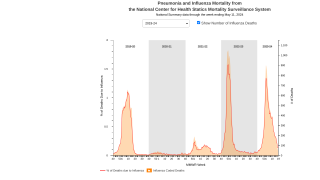Research Indicates Association Between Miscarriages and Flu Vaccine

A new study published in the journal Vaccine found a possible link between the flu vaccine, and miscarriage early in pregnancy.
The research found women who had miscarriages between 2010 and 2012 were more likely to have received the flu vaccine two years in a row.
This finding does not necessarily show flu vaccines directly cause miscarriages.
This is the first study to identify a potential link between the flu vaccine and miscarriage.
In 2009, vaccine manufacturers developed flu vaccines to protect against the new H1N1 strain, which was a different virus than previous flu viruses.
The research focused on women who had miscarried within 28 days of getting a flu shot, that included protection against swine flu (H1N1), and if the women also had had a flu shot the previous season.
These researchers found 17 of 485 miscarriages they studied involved women whose vaccinations followed that pattern.
"We are not saying this is a causal relationship," James Donahue, Ph.D., a senior epidemiologist at the Marshfield Clinic and the lead author of the study, told the Center for Infectious Disease Research and Policy.
"There's no biological basis for this phenomenon, so the study represents something that wasn't expected," said Dr. Donahue.
In fact, they aren’t clear if this research is a statistical fluke. The researchers are already looking at data for subsequent years to try to determine if the association is real, and if it is, whether it is still ongoing.
Observational research studies cannot prove that something, like a flu shot, caused something else, like a miscarriage. Causality can only be proven through clinical trials that randomly select people and select other people who are similar to receive a placebo, and then monitor the results.
However, because flu shots are recommended by the CDC for all pregnant women in the US, this type of study could not be conducted in the United States.
The CDC recommends everyone 6 months of age and older should get a flu vaccine every season. Vaccination to prevent influenza is particularly important for people who are at high risk of serious complications from influenza.
"I think it's really important for women to understand that this is a possible link, and it is a possible link that needs to be studied and needs to be looked at over more [flu] seasons," Amanda Cohn, a senior adviser for vaccines at the CDC, which funded the study, told The Washington Post.
"I want the CDC and researchers to continue to investigate this," Dr. Laura Riley, a Boston-based obstetrician who leads a committee on maternal immunization told the AP.
"But as an advocate for pregnant women, what I hope doesn't happen is that people panic and stop getting vaccinated," said Dr. Riley.
Flu vaccines are approved for specific groups of people.
Factors that can determine a person’s suitability for vaccination, or vaccination with a particular vaccine, include a person’s age, current and past health issues, and allergies.
A World Health Organization working group conducted an extensive review of disease burden related to maternal influenza immunization and concluded that available data are currently insufficient to estimate the potential impact of maternal immunization programs on severe influenza illness.
Most pharmacies offer several flu vaccines. The cost varies depending upon your insurance and which state you live.
The CDC Vaccine Price List provides the private sector vaccine prices for general information.
Vaccine discounts can be found here.
Our Trust Standards: Medical Advisory Committee

























